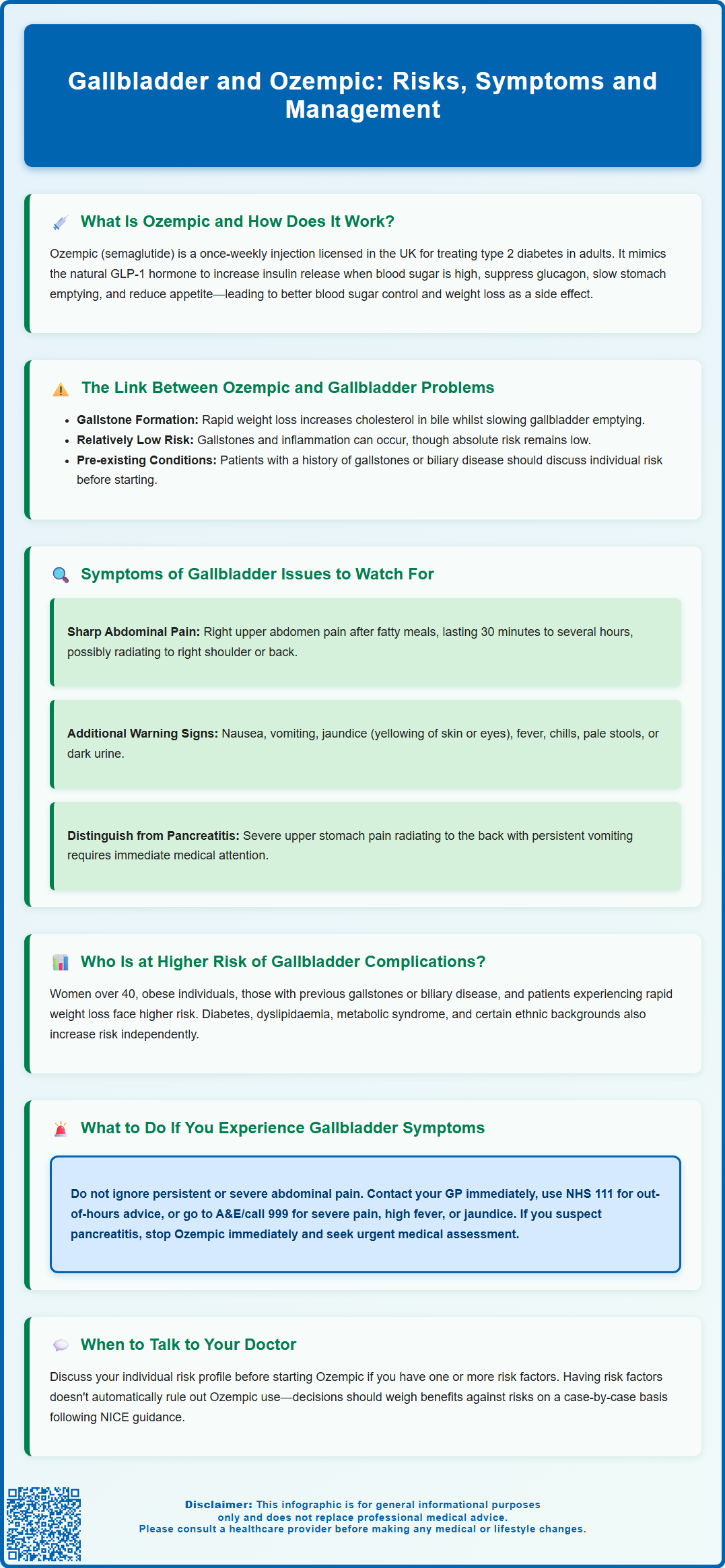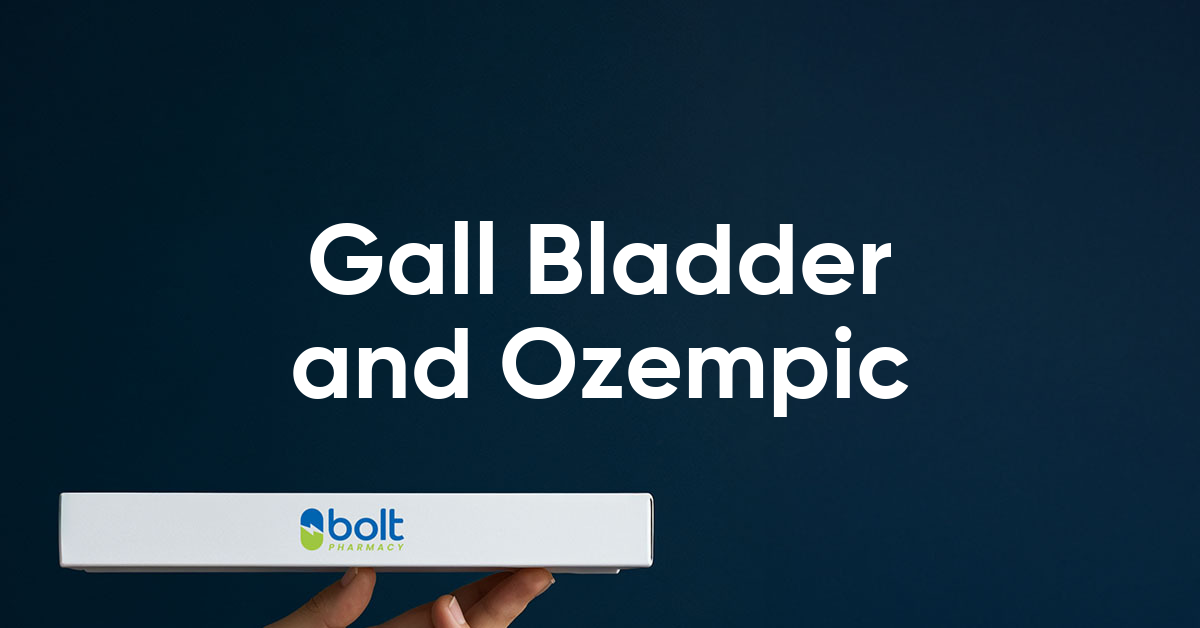Ozempic (semaglutide) is a glucagon-like peptide-1 (GLP-1) receptor agonist licensed in the UK for treating type 2 diabetes mellitus in adults. Whilst effective in improving blood glucose control, emerging evidence links Ozempic and other GLP-1 agonists to an increased risk of gallbladder complications, including gallstones and cholecystitis. Understanding this association, recognising warning symptoms, and knowing when to seek medical advice are essential for patients and healthcare professionals. This article examines the relationship between Ozempic and gallbladder health, outlines key risk factors, and provides guidance on managing potential complications in line with UK clinical standards.
Summary: Ozempic (semaglutide) is associated with an increased risk of gallbladder complications, including gallstones and cholecystitis, primarily due to rapid weight loss and altered gallbladder motility.
- Ozempic is a GLP-1 receptor agonist licensed in the UK for type 2 diabetes, administered as a once-weekly subcutaneous injection.
- Gallbladder disorders are recognised adverse reactions listed in the Ozempic Summary of Product Characteristics.
- Rapid weight loss and reduced gallbladder motility contribute to bile stasis and cholesterol crystallisation, increasing gallstone risk.
- Key warning symptoms include right upper quadrant pain, nausea, vomiting, jaundice, fever, and changes in stool or urine colour.
- Patients experiencing severe abdominal pain, fever, or jaundice should contact their GP promptly or seek emergency care.
- Higher-risk groups include women over 40, those with rapid weight loss, obesity, previous gallstones, or metabolic syndrome.
Table of Contents
What Is Ozempic and How Does It Work?
Ozempic (semaglutide) is a prescription medication licensed in the UK for the treatment of type 2 diabetes mellitus in adults. It belongs to a class of drugs known as glucagon-like peptide-1 (GLP-1) receptor agonists. Ozempic is administered as a once-weekly subcutaneous injection and works to improve blood glucose control while often resulting in weight reduction as a secondary effect.
The mechanism of action of Ozempic centres on mimicking the naturally occurring hormone GLP-1, which is released by the intestine in response to food intake. By binding to GLP-1 receptors, semaglutide enhances insulin secretion in a glucose-dependent manner, meaning it stimulates insulin release only when blood glucose levels are elevated. This reduces the risk of hypoglycaemia compared to some other diabetes medications. Additionally, Ozempic suppresses glucagon secretion, slows gastric emptying, and promotes satiety through central appetite regulation, all of which contribute to improved glycaemic control and weight reduction.
In the UK, Ozempic is licensed by the Medicines and Healthcare products Regulatory Agency (MHRA) and is recommended by the National Institute for Health and Care Excellence (NICE) in guideline NG28 for adults with type 2 diabetes. NICE recommends GLP-1 receptor agonists in specific circumstances, such as when metformin is contraindicated or not tolerated, or as an add-on therapy. It is important to note that Ozempic is not licensed for weight management in the UK (unlike Wegovy, which contains the same active ingredient at higher doses). Current NHS guidance discourages off-label prescribing of GLP-1 receptor agonists for weight loss due to supply constraints.

The Link Between Ozempic and Gallbladder Problems
Cholelithiasis (gallstones) and cholecystitis (inflammation of the gallbladder) are recognised adverse reactions listed in the Ozempic Summary of Product Characteristics (SmPC). These and other gallbladder and biliary disorders, including biliary colic, have been reported in patients taking GLP-1 receptor agonists including semaglutide. While the absolute risk remains relatively low, it is important for both patients and healthcare professionals to be aware of this potential complication.
The mechanism linking Ozempic to gallbladder problems is multifactorial. Rapid weight loss, a common effect of GLP-1 agonists, is a well-established risk factor for gallstone formation. When weight is lost quickly, the liver secretes extra cholesterol into bile, and reduced gallbladder motility—partly due to the drug's effect on gastric emptying—can lead to bile stasis. This creates an environment conducive to cholesterol crystallisation and stone formation. Some research also suggests that GLP-1 receptor agonists may affect gallbladder contractility, potentially contributing to bile stagnation.
Clinical trial data and post-marketing surveillance have identified gallbladder-related adverse events in patients taking semaglutide. The European Medicines Agency (EMA) and MHRA continue to monitor safety data. It is important to note that there is no official contraindication to using Ozempic in patients without pre-existing gallbladder disease, but awareness and vigilance are advised. Patients with a history of gallstones or biliary disease should discuss their individual risk profile with their prescribing clinician before starting treatment.
It's also worth noting that abdominal pain in patients taking GLP-1 receptor agonists may sometimes indicate pancreatitis, which requires prompt assessment and management.
Symptoms of Gallbladder Issues to Watch For
Recognising the symptoms of gallbladder problems early is crucial for timely intervention and preventing complications such as acute cholecystitis or biliary obstruction. Patients taking Ozempic should be educated about the warning signs and encouraged to seek medical advice if they develop concerning symptoms.
Key symptoms of gallbladder disease include:
-
Right upper quadrant or epigastric pain: This is often the hallmark symptom, typically described as a sharp, cramping, or constant pain that may radiate to the right shoulder or back. Pain episodes (biliary colic) often occur after eating, particularly fatty meals, and may last from 30 minutes to several hours.
-
Nausea and vomiting: These frequently accompany gallbladder pain and may be persistent, especially during acute episodes.
-
Jaundice: Yellowing of the skin and whites of the eyes suggests possible bile duct obstruction and requires urgent medical assessment.
-
Fever and chills: These symptoms may indicate acute cholecystitis or infection and warrant immediate medical attention.
-
Changes in stool or urine colour: Pale, clay-coloured stools or dark urine can signal bile flow obstruction.
It is important to differentiate gallbladder pain from other causes of abdominal discomfort, including gastritis, peptic ulcer disease, pancreatitis, or musculoskeletal pain. Pancreatitis, a rare but serious potential complication of GLP-1 receptor agonists, typically presents with severe epigastric pain radiating to the back, often with persistent vomiting.
If you experience severe, persistent abdominal pain, fever, or jaundice while taking Ozempic, contact your GP promptly, call NHS 111 for advice outside normal hours, or seek emergency care. Early diagnosis through clinical assessment, blood tests (including liver function tests and, where appropriate, amylase/lipase), and imaging (typically ultrasound) can guide appropriate management and prevent serious complications.
Who Is at Higher Risk of Gallbladder Complications?
While gallbladder problems can potentially affect anyone taking Ozempic, certain patient groups are at higher baseline risk and may require closer monitoring or individualised risk-benefit assessment before starting treatment.
Risk factors for gallbladder disease include:
-
Rapid or significant weight loss: Rapid weight loss increases gallstone risk substantially. Patients experiencing pronounced weight reduction on Ozempic should be particularly vigilant.
-
Female sex and age: Women, especially those over 40, have a higher incidence of gallstones.
-
Obesity: Paradoxically, while obesity increases gallstone risk, rapid weight loss in obese individuals compounds this risk further.
-
Previous history of gallstones or biliary disease: Patients with known cholelithiasis, even if asymptomatic, may be at increased risk of developing symptomatic disease during treatment.
-
Certain ethnic backgrounds: Some populations have higher baseline gallstone prevalence due to genetic factors.
-
Metabolic factors: Diabetes itself, dyslipidaemia, and metabolic syndrome are independent risk factors for gallbladder disease.
-
Prolonged fasting or very low-calorie diets: These can reduce gallbladder motility and promote stone formation.
If you fall into one or more of these higher-risk categories, discuss your individual risk profile with your healthcare provider before starting Ozempic. While routine baseline ultrasound screening is not standard practice in the UK, your clinician may consider investigations based on your symptoms and medical history. The presence of risk factors does not automatically preclude Ozempic use—clinical decisions should balance potential benefits against risks on a case-by-case basis, in line with NICE guidance on individualised diabetes care.
What to Do If You Experience Gallbladder Symptoms on Ozempic
If you develop symptoms suggestive of gallbladder disease while taking Ozempic, prompt action is essential to ensure appropriate investigation and management. Do not ignore persistent or severe abdominal pain, as delayed treatment of gallbladder complications can lead to serious outcomes including perforation, sepsis, or pancreatitis.
Immediate steps to take:
-
Contact your GP or healthcare provider: Describe your symptoms in detail, including the location, character, and timing of pain, and any associated symptoms such as fever, vomiting, or jaundice. Same-day or urgent appointments may be warranted.
-
Call NHS 111: If you cannot reach your GP and need advice outside normal hours, NHS 111 can provide guidance on accessing appropriate care.
-
Seek emergency care if needed: If you experience severe, unrelenting pain, high fever, jaundice, or signs of systemic illness, attend your local Emergency Department or call 999.
-
If pancreatitis is suspected: If you have severe epigastric pain radiating to the back with persistent vomiting, discontinue Ozempic immediately and seek urgent medical assessment, as per the SmPC guidance.
Diagnostic approach typically includes clinical assessment, blood tests (liver function tests, inflammatory markers, and where appropriate, amylase/lipase), and abdominal ultrasound, which is the first-line imaging modality for suspected gallbladder disease. If gallstones or cholecystitis are confirmed, management options range from conservative measures and pain relief to surgical intervention (cholecystectomy), depending on severity and clinical presentation.
Your healthcare team will work with you to determine whether Ozempic can be safely continued or if alternative diabetes treatments should be considered. This decision will be based on the nature and severity of your gallbladder condition and your overall clinical picture. Open communication with your healthcare provider is key to balancing effective diabetes management with minimising potential risks.
If you believe you have experienced a side effect from Ozempic, you or your healthcare professional can report this through the MHRA Yellow Card scheme, which helps monitor the safety of medicines in the UK.
Frequently Asked Questions
Can Ozempic cause gallbladder problems?
Yes, Ozempic (semaglutide) is associated with an increased risk of gallbladder complications, including gallstones and cholecystitis. These are recognised adverse reactions listed in the Summary of Product Characteristics, primarily linked to rapid weight loss and altered gallbladder motility.
What are the warning signs of gallbladder issues whilst taking Ozempic?
Key symptoms include right upper quadrant or epigastric pain (often after meals), nausea, vomiting, jaundice, fever, and changes in stool or urine colour. Severe or persistent symptoms require prompt medical assessment.
Should I stop taking Ozempic if I develop gallbladder symptoms?
Do not stop Ozempic without medical advice. Contact your GP or healthcare provider immediately if you develop symptoms suggestive of gallbladder disease, and seek emergency care for severe pain, fever, or jaundice. Your clinician will determine the appropriate course of action based on your individual circumstances.
The health-related content published on this site is based on credible scientific sources and is periodically reviewed to ensure accuracy and relevance. Although we aim to reflect the most current medical knowledge, the material is meant for general education and awareness only.
The information on this site is not a substitute for professional medical advice. For any health concerns, please speak with a qualified medical professional. By using this information, you acknowledge responsibility for any decisions made and understand we are not liable for any consequences that may result.
Heading 1
Heading 2
Heading 3
Heading 4
Heading 5
Heading 6
Lorem ipsum dolor sit amet, consectetur adipiscing elit, sed do eiusmod tempor incididunt ut labore et dolore magna aliqua. Ut enim ad minim veniam, quis nostrud exercitation ullamco laboris nisi ut aliquip ex ea commodo consequat. Duis aute irure dolor in reprehenderit in voluptate velit esse cillum dolore eu fugiat nulla pariatur.
Block quote
Ordered list
- Item 1
- Item 2
- Item 3
Unordered list
- Item A
- Item B
- Item C
Bold text
Emphasis
Superscript
Subscript












